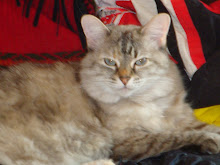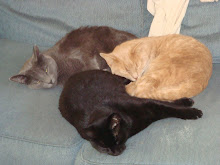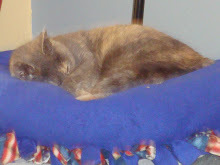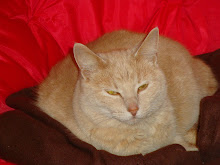I am notorious for clipping out articles that catch my attention and in the Readers Digest from I think 1984 there was an article called Iowa's Midsummer Bike Dream..By Phillip Ross. I found it very interesting so I am going to reprint it here for you. I hope that you enjoy it as much as I did...PEACE
Iowa's Midsummer Bike Dream...By Phillip Ross
I am leaning against my bike under a shade tree in front of a farmhouse in northeastern Iowa. It is late July 1983, the temperature is above 90, and I'm exhausted. My odometer says I've put in 70 miles of back roads since morning. My body says I'm hurting all over. The map says I have 35 miles to go.
A few feet away an endless stream of bikers is passing, 7000 in all. Watching them, I ask myself, What am I, a city boy who gave up two wheelers 30 years ago, doing in this thing called Ragbrai?
Ragbrai is an acronym for the Register's Annual Great Bicycle Ride Across Iowa, the largest event of it's kind in the world. It is a 500 mile week-long trek that began 11 years ago when two writers from the Des Moines Register set out on a lark to prove that their state wasn't flat. As they filed stories each night, other bikers joined them en route. In the years since , more than 50,000 people from all 50 states and as far away as Australia have come along for the ride, and many make it an annual pilgrimage.
Why am I among them? In New York City, I had asked friends who are native Iowans what is so special about Ragbrai. When one of them said, "Ragbrai is like seeing a Norman Rockwell painting come alive," I was hooked. I mailed my application to the Register, together with $12.50 to have my luggage trucked along the route. Then I laid out $300 for a bike and flew to the Hawkeye State...
Saturday, July 23rd, 1983
I get a ride from Des Moines west to Onawa, the staging p;oint for this year's ride. On the outskirts of this town of 3283, a sign greets up: You'll like us. We are friendly. Cars, buses and vans, all laden with bicycles mounted upside down, are converging on a campground spreading around the Ragbrai information booth.
Hundreds of bikers head out of town for the ritualistic dip of their rear wheels in the muddy Missouri River, the state's western border with Nebraska. I look for the first of the families I have arranged to stay with by writing to local chambers of commerce. My host is Chuck Orsini, co-chairman of the Onawa Ragbrai Committee. Chuck tells me that ha and none co-workers have spent 200 hours each planning for this day since Onawa was notified of its selection to be a host town nearly six months ago. (Communities vie to be part of a route that changes from year to year)
Sunday July 24th, 1983
By 5:30 a.m. hosts of bikers are standing in line for the two dollar pancakes and sausage breakfast that Chuck's crew has been preparing since two o'clock. I begin to pedal at six. There is a slight drizzle, welcome relief from the heat. As far as the eye can see, front or back, there are bikers. They are riding two and three abreast, moving like alien creatures into the early Dawn. As we pedal into hill country past mile after mile of corn and soybean fields, the only sounds are of birds chirping and gears shifting.
We have 62 miles to go this day to Harlan. With only a third of it gone, I am ready to concede that not all Iowa is flat. My thighs are aching from the hills. At Soldier, I stop for coffee and hear that among the bikers who will become legends on this tour are two Hawkeyes riding a tandem. The man in front, 32 year old Herbie Althaus, has no legs and pedals with artificial limbs. The man in back, 36 year old Pat McLuen, is blind. i have seen another much talked of biker, Henry Braafhart. he has gray hair, and the back of his T-shirt reads "82 and Good as New."
At the halfway point, the heavens open up. I haven't packed rain gear, and for ten miles struggle against head winds.I arrived soaking wet in Panama, a town of 300, where several hundred bikers have taken refuge in a grove of trees. Sitting in a car under one of these trees is John Dressel, his gravelly voice booming over a microphone "Welcome to Panama. Free beer and lemonade. Polish sausages one dollar." John is a retired farmer, and as I dry off at his side he tells me that he has bad feet and that his mike comes from being civil defense director, "which entails watching for tornado's and some other things that I cannot recall right now."
The rain stops. The hills continue. I see young racers riding one behind the other, wheels almost touching, to cut down the wind resistance. I see the dawdlers who are content to enjoy the scenery. There are the oddities: a group in war paint, a women carrying a dachshund in her rear basket, a few who are pedaling odd contraptions that do not look much like bicycles. The Oettings, Mike and Elena, are hauling there two young children in a buggy attached to the rear of Mike's bike. When I comment that pulling two kids 50 miles would not be my idea of a fun family vacation, he smiles. "Fun is not what we are looking for," he says "Adventure is."
Monday, July 25th, 1983
This is Ragbrai's shortest day, 46 miles to Guthrie Center, and it takes only a few miles to figure out why. Hills, hills, hills.
I chug along side a white haired women who tells me she's 73 and is slow pedaling up the hills but enjoys coming down them. I wish her well and pick up my pace. Coasting down another hill, I hear a loud "Whoopee!" I turn my head just in time to watch her whiz past.
Soon I spot a farmer sitting on his front lawn. "Nice to see you," I say. "You betcha" he answers. " How far to Kimballton?" I ask. " Two and a half hills up the road," he says.
Kimballton is a Danish town, lined with Danish and American flags. As in all the other villages en route, Kimballton's people have pulled out the stops for us bikers. The hot item on their menu is aebleskiver-sugary Danish pancakes- and there are long lines waiting to try them. A resident tells me about Kimballton's monthly dances, attended by people of all ages. I tell her I cannot imagine my two teenage daughters going to a dance with their father back in New York. "I guess things are a little different here,: she replies.
That afternoon, I ride for five miles atop along ridge under billowy clouds. The ridge is known as the "M and M" because water on it's western side flows to the Missouri and on it eastern side to the Mississippi. In every direction there are views of patchwork fields with farmhouses and barns, each separate, each complete, each producing. It is all quietly exhilarating, and I try to store up on it, as thought it were energy, for the hills.
I arrive in Guthrie Center exhausted. There are lines for food, cold showers and chemical toilets. I buy a soft drink from three 12 year old girls raising funds for the Valley reamers 4-H club.They say they are very excited about having us here. I ask Why. "Because Guthrie Center is usually boring," Julie Schoonover says. "Dull," Julie Donovan adds. "Dead, " chimes in Teresa McCool.
When I ask where else they'd like to live, they exchanger glances and say that, well, maybe Guthrie Center is as good a place as any.
Tuesday, July 26th, 1983
Up and at 'em at 5:30. Mist hangs low over a field of soybeans. But outside of town the road rises, and the early-morning sun is hitting the spokes of the wheels...flash,flash,flash... as hundreds of bikes ascend as if to heaven.
I share this breathtaking scene with two 23 year old women, Lori Salus and her friend Kate Lounsberry, both from Oregon. They rather matter of fact tell me that they began biking six weeks ago in Oregon, timed their trip to hook up with Ragbrai, and will continue on at week's end to Michigan.
The hills suddenly end and we are in the Iowas I have been eagerly looking forward to...flat as she goes. On the way to Ames, we hit a stretch of four lane highway where we are brushed by the draft from passing trucks. a jarring reminder of how much Ragbrai depends on the practically car-less secondary roads we mostly use.
A few miles onto country roads again, and I come to Bouton, population 130. I hitch my steed outside the air conditioned oasis of Friendship Hall of the Christ Lutheran Church. Inside there's a counter overflowing with homemade cakes, pies, sandwiches. I stoke up for for 70 cents.
Wednesday, July 27th, 1983
The less said about this day the better. I am up at five, and everything inside me rebels against biking 71 miles today. I pedal slowly out of town, cursing Ragbrai, Iowa and myself. Half a day later. I lie down to nap. Ants crawling over y legs motivate me to move on. I feel a surge of strength and pedal furiously for 15 miles. When I stop for lemonade, I am filled with self congratulations. Then I overhear several bikers talking about how easy the last stretch was because we had a tail wind. So much for my inner resources.
I am picked up at day's end by my friends the Coursons and Lynners. They take me to their lakeside cottage, were everyone has helped prepare a potluck dinner.
Thursday, July 28th, 1983
A welcome break. To get an overview of Ragbrai, I ride the "sag wagon" a van and trailer that moves up and down the road picking up bikes and bikers who have broken down. The volunteer driver is Kay Reasoner, a legal secretary from Des Moines.
We begin our ride at 9:30 a.m. and, within an hour, have our full complement of 16 riders. These include a family of four with bad colds, plus two teenagers with knee problems. All enter the van silently, with a sense of defeat that is not reduced by the good natured boos and shouts of "Never!" that the sag wagon draws when it passes bikers.
Kay fills me in on a nursing mother whose husband was riding with the baby. The two became separated, feeding time arrived, and bikers began passing word of the problem until the parents were reunited. A different kind of reunion story Kay tells me is about a "same time next year" couple who make the bike ride their annual tryst.
Friday, July 29th, 1983
This is the big one, 105 miles from Grundy Center to Manchester. I am up at five and raring to go. My sense of purpose lasts until I step outside. It is raining steadily. I begin riding with the enthusiasm of someone on the way to an IRS audit.
A mile or two out, the rain stops, and the day emerges cool and cloudy, ideal biking weather. Energy surges as I move through countryside aromatic with alfalfa and clover. I stop at Brandon's Koffee Kup Kafe, where the curtains are checkered red and while, and along one wall are photographs of every high school graduating class since 1920. Some of the pictures have only six faces. I order homemade muffins, bacon and eggs, all of which taste like they are supposed to.
By 11, I'm slowing down. I stop at the 68 mile marker for a rest. I know I must be getting tired because I check my odometer when I get off the bike and check it again when I leave, to see if, by some miracle, it has advanced.
As I leave one rest stop, I hear the shrill screams of hogs. A farmer is using an electric prod to move his fattened crop up a ramp into a big semi, which he tells me will deliver them to the slaughterhouse.
I am feeling grim for the next ten miles. But as I enter dairy country, where cows live linger, my outlook improves. Later, when my odometer reads 92, I swell with pride.
Coming down the homestretch, I begin to see this week as a metaphor. We are all different and all ultimately alone. Yet we are making the journey together, reflections off the same prism. I am getting maudlin about my fellow riders and the hospitable people along the way when suddenly I hit Manchester. It is 4:20, the odometer says 104, and I feel the warm glow I felt coming home from the Army.
Saturday, July 30th, 1983
It's a measly 59 miles to Dubuque and departure. At the food stands outside Dyersville's St. Francis Xavier Church, bikers are downing bratwurst and corn even though it's only 8:30a.m. A band is playing polka music, and several riders begin to dance.
In Dubuque, there is a breakup celebration overlooking the Mississippi. Front wheels are dipped in the river to symbolize the crossing of one of the few states bordered by two great rivers. Beer is consumed in great quantities, and a stand to set up for farewell speeches.
Flying east over Illinois, I look out he window, back at Iowa and the week that was. Images float past me, of doors being opened to strangers, of physical endurance, of a landscape that lies right out there, direct and guileless, like the people who inhabit it.
Before I left New York, I had wondered out loud to a friend what it was that I , who have experienced the excitement of both coasts, was looking for on the back roads of Iowa. "Perhaps," she said, "to see if the center holds" And now I am coming back to tell her that it does.
This was written almost 25 years ago. alot about RAGBRAI has changed yet alot has remained the same...Perhaps the center does still hold...PEACE
Subscribe to:
Post Comments (Atom)




2 comments:
Cool story!
Well written article.
Post a Comment